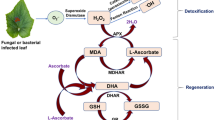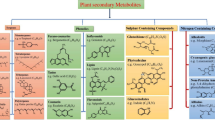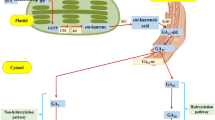Abstract
Plants possess a sophisticated hormone-signaling system, which includes salicylic acid (SA) and jasmonic acid (JA), to defend themselves from herbivores. In addition, this immune system is modulated by nonpathogenic microbes that live asymptomatically within intercellular spaces of host grasses. We investigated the resistance triggered by defense hormones, and that provided by endophyte Epichloë gansuensis against aphid Rhopalosiphum padi, and how the endophyte regulates this tripartite interaction. We detected that endophyte-induced plant tolerance to the aphid feeding and exogenous SA increased plant shoot biomass, root biomass, plant length, and chlorophyll content. Endophyte colonization induces the WRKY54 factor that overrides negative effects on plant growth and possibly suppresses SA accumulation. In addition, the endophyte promotes a level of JA that is antagonistic to the SA pathway. By disabling the SA mechanism for herbivore-mediated plant growth inhibition, the endophyte induces plant tolerance to herbivory.









Similar content being viewed by others
References
Ballaré CL (2014) Light regulation of plant defense. Annu Rev Plant Biol 65:335–363. https://doi.org/10.1146/annurev-arplant-050213-040145
Bastías DA, Martinez-Ghersa MA, Ballaré CL, Gundel PE (2017) Epichloë fungal endophytes and plant defenses: not just alkaloids. Trends Plant Sci 22:939–948. https://doi.org/10.1016/j.tplants.2017.08.005
Bastías DA, Martínez-Ghersa MA, Newman JA, Card SD, Mace WJ, Gundel PE (2018a) The plant hormone salicylic acid interacts with the mechanism of anti-herbivory conferred by fungal endophytes in grasses. Plant Cell Environ 41:395–405. https://doi.org/10.1111/pce.13102/full
Bastías DA, Martínez-Ghersa MA, Newman JA, Card SD, Mace WJ, Gundel PE (2018b) Jasmonic acid regulation of the anti-herbivory mechanism conferred by fungal endophytes in grasses. J Plant Ecol 106:2365–2379. https://doi.org/10.1111/1365-2745.12990
Bastías DA, Martínez-Ghersa MA, Newman JA, Card SD, Mace WJ, Gundel PE (2019) Sipha maydis sensitivity todefences of Lolium multiflorum and its endophytic fungus Epichloè occultans. Peer J 7:e8257. https://doi.org/10.7717/peerj.8257
Bouma TJ, Nielsen KL, Koutstaal B (2000) Sample preparation and scanning protocol fo computerised analysis of root length and diameter. Plant Soil 218:185–196. https://doi.org/10.1023/A:1014905104017
Brem D, Leuchtmann A (2002) Intraspecific competition of endophyte infected vs. uninfected plants of two woodland grass species. Oikos 96:281–290. https://doi.org/10.2307/3547731
Cao Y, Halane MK, Gassmann W, Stacey G (2017) The role of plant innate immunity in the legume-Rhizobium symbiosis. Annu Rev Plant Biol 68:535–561. https://doi.org/10.1146/annurev-arplant-042916-041030
Chen W, Provart NJ, Glazebrook J, Katagiri F et al (2002) Expression profile matrix of Arabidopsis transcription factor genes suggests their putative functions in response to environmental stresses. Plant Cell 14:559–574. https://doi.org/10.1105/tpc.010410
Chen J, Nolan T, Ye H et al (2017) Arabidopsis WRKY46, WRKY54, and WRKY70 transcription factors are involved in brassinosteroid-regulated plant growth and drought responses. Plant Cell 29:1425–1439. https://doi.org/10.1105/tpc.17.00364
Cosme M, Lu J, Erb M et al (2016) A fungal endophyte helps plants to tolerate root herbivory through changes in gibberellin and jasmonate signaling. New Phytol 211:1065–1076. https://doi.org/10.1111/nph.13957
De Vries S, De Vries J, Teschke H, Von Dahlen JK, Rose LE, Gould SB (2018) Jasmonicand salicylic acid response in the fern Azolla filiculoides and its cyanobiont. Plant Cell Environ 41:2530–2548. https://doi.org/10.1111/pce.13131
Dong J, Chen C, Chen Z (2003) Expression profiles of the Arabidopsis WRKY gene superfamily during plant defense response. Plant Mol Biol 51:21–37. https://doi.org/10.1023/A:1020780022549
Dupont P, Eaton CJ, Wargent J, Fechtner S, Solomon P, Schmid J, Day RC, Scott B, Cox MP (2015) Fungal endophyte infection of ryegrass reprograms host metabolism and alters development. New Phytol 208:1227–1240. https://doi.org/10.1111/nph.13614
Faeth SH, Bultman TL (2002) Endophytic fungi and interactions among host plants, herbivores, and natural enemies. Multitrophic Level Interactions. Cambridge: Cambridge University Press
Faeth SH, Fagan WF (2002) Fungal endophytes: common host plant symbionts but uncommon mutualists. Integr Comp Biol 42:360–368. https://doi.org/10.1093/icb/42.2.360
Glazebrook J (2005) Contrasting mechanisms of defense against biotrophic and necrotrophic pathogens. Annu Rev Phytopathol 43:205–227. https://doi.org/10.1146/annurev.phyto.43.040204.135923
Gutjahr C (2014) Phytohormone signaling in arbuscular mycorhiza development. Curr Opin Plant Biol 20:26–34. https://doi.org/10.1016/j.pbi.2014.04.003
Haerri SA, Krauss J, Mueller CB (2009) Extended larval development time for aphid parasitoids in the presence of plant endosymbionts. Ecol Entomol 34:20–25. https://doi.org/10.1111/j.1365-2311.2008.01037.x
Hauvermale AL, Steber ACM (2012) Update on gibberellin signaling: a theme and variations on DELLA repression. Plant Physiol 160:83–92. https://doi.org/10.2307/23274677
Hayat O, Havat S, Irfan M, Ahmad A (2010) Effect of exogenous salicylic acid under changing environment: a review. Environ Exp Bot 68:14–25. https://doi.org/10.1016/j.envexpbot.2009.08.005
Jiang YJ, Qiu YP, Hu YR, Yu DQ (2016) Heterologous expression of AtWRKY57 confers drought tolerance in Oryza sativa. Front Plant Sci 171:2771–2782. https://doi.org/10.3389/fpls.2016.00145
Johnson LJ, Johnson RD, Schardi CL, Panaccione DG (2003) Identification of differentially expressed genes in the mutualistic association of tall fescue with Neotyphodium coenophialum. Physiol Mol Plant Pathol 63:305–317. https://doi.org/10.1016/j.pmpp.2004.04.001
Karban R, Baldwin I (1997) Induced Responses to Herbivory. University of Chicago Press
Kunkel BN, Brooks DM (2002) Cross talk between signaling pathways in pathogen defense. Curr Opain Plant Biol 5:325–331. https://doi.org/10.1016/S1369-5266(02)00275-3
Latch GCM (1993) Physiological interactions of endophytic fungi and their hosts. Biotic stress tolerance imparted to grasses by endophytes. Agr Ecosyst Environ 44:143–156. https://doi.org/10.1016/0167-8809(93)90043-O
Lee HI, Raskin I, Leon J (1995) Biosynthesis and metabolism of salicylic acid. Proc Natl Acad Sci USA 92:4076–4079
Li CJ, Nan ZB, Gao J, Tian P (2004) Detection and distribution of Neotyphodium-Achnatherum inebrians association in China. Proceedings of 5th International Neotyphodium/Grass Interactions Symposium, Arkansas, USA, pp 24–27
Li J, Brader G, Palva ET (2004b) The WRKY70 transcription factor: a node of convergence for jasmonate-mediated and salicylate-mediated signals in plant defense. Plant Cell 16:319–331. https://doi.org/10.1105/tpc.016980
Lu J, Robert CAM, Riemann M, Cosme M, Mène-Saffrané L, Massana J, Stout MI, Lou Y, Gershenzon I, Erb M (2015) Induced jasmonate signaling leads to contrasting effects on root damage and herbivore performance. Plant Physiol 167:1100–1116. https://doi.org/10.1104/pp.114.252700
Meister B, Krauss J, Härri SA, Victoria Schneider M, Müller CB (2006) Fungal endosymbionts affect aphid population size by reduction of adult life span and fecundity. Basic Appl Ecol 7:244–252. https://doi.org/10.1016/j.baae.2005.06.002
Moreira X, Abdala-Roberts L, Castagneyrol B (2018) Interactions between plant defence signalling pathways: evidence from bioassays with insect herbivores and plant pathogens. J Ecol 106:2353–2364. https://doi.org/10.1111/1365-2745.12987
Müller CB, Krauss J (2005) Symbiosis between grasses and asexual fungal endophytes. Curr Opin Plant Biol 8:450–456. https://doi.org/10.1016/j.pbi.2005.05.007
Mur LAJ, Kenton P, Atzorn R (2006) The outcomes of concentration-specific interactions between salicylate and jasmonate signaling include synergy, antagonism, and oxidative stress leading to cell death. Plant Physiol 140:249–262. https://doi.org/10.1104/pp.105.072348
Nakashima K, Ito Y, Yamaguchi-Shinozaki K (2009) Transcriptional regulatory networks in response to abiotic stresses in Arabidopsis and grasses. Plant Physiol 149:88–95. https://doi.org/10.1104/pp.108.129791
Navarro-Meléndez AL, Heil M (2014) Symptomless endophytic fungi suppress endogenous levels of salicylic acid and interact with the jasmonate-dependent indirectdefense traits of their host, lima bean (Phaseolus lunatus). J Chem Ecol 40:816–825. https://doi.org/10.1007/s10886-014-0477-2
Oberhofer M, Güsewell S, Leuchtmann A (2014) Effects of natural hybrid and non-hybrid epichloe endophytes on the response of Hordelymus europaeus to drought stress. New Phytol 201:242–253. https://doi.org/10.1111/nph.12496
Oerke EC (2006) Crop losses to pests. J Agric Sci 144:31–43. https://doi.org/10.1017/S0021859605005708
Pandey SP, Somssich IE (2009) The role of WRKY transcription factors in plant immunity. Plant Physiol 150:1648–1655. https://doi.org/10.1104/pp.109.138990
Pozo MJ, López-Ráez JA, Azcón-Aguilar C, Garcia-Garrido JM (2015) Phytohormones as integrators of environmental signals in the regulation of mycorrhizal symbioses. New Phytol 205:1431–1436. https://doi.org/10.1111/nph.13252
Prestidge RA, Pottinger RP, Barker GM (1982) An association of Lolium endophyte with ryegrass resistance to Argentine Stem Weevil. Proceedings of the 35th New Zealand Weed and Pest Control Conference, vol 35. Hamilton, New Zealand, pp 119–122
Rodhe A, Morreel K, Ralph J (2004) Molecular phenotyping of the pal1 and pal2 mutants of Arabidopsis thaliana reveals far-reaching consequences on phenylpropanoid, Amino Acid, and Carbohydrate Metabolism. Plant Cell 16:218–231. https://doi.org/10.1105/tpc.104.023705
Saari S, Helander M, Faeth SH, Saikkonen K (2010) The effects of endophytes on seed production and seed predation of tall fescue and meadow fescue. Microb Ecol 60:928–934. https://doi.org/10.1007/s00248-010-9749-8
Schardl CL, Grossman RB, Nagabhyru P, Faulkner JR, Mallik UP (2007) Loline alkaloids: currencies of mutualism. Phytochemistry 68:980–996. https://doi.org/10.1016/j.phytochem.2007.01.010
Schoonhoven LM et al (2005) Insect-plant biology. Oxford University Press, Oxford
Schwartzberg EG, Tumlinson JH (2014) Aphid honeydew alters plant defence responses. Funct Ecol 28:386–394. https://doi.org/10.1111/1365-2435.12182
Schweiger R, Heise AM, Persicke M, Müller C (2014) Interactions between the jasmonic and salicylic acid pathway modulate the plant metabolome and affect herbivores of different feeding types. Plant Cell Environ 37:1574–1585. https://doi.org/10.1111/pce.12257
Stacey G, Mcalvin CB, Kim SY, Olivares I, Soto MJ (2006) Effects of endogenous salicylic acid on nodulation in the model legumes Lotus japonicus and Medicago truncatula. Plant Physiol 141:1473–1481. https://doi.org/10.1104/pp.106.080986
Thaler JS, Humphrey PT, Whiteman NK (2012) Evolution of jasmonate and salicylate signal crosstalk. Trends Plant Sci 17:260–270. https://doi.org/10.1016/j.tplants.2012.02.010
Thom ER, Popay AJ, Waugh CD, Minne EE (2014) Impact of novel endophytes in perennial ryegrass on herbage production and insect pests from pastures under dairy cow grazing in northern New Zealand. Grass Forage Sci 69:191–204. https://doi.org/10.1111/gfs.12040
Tong X, Qi JF, Zhu XD, Mao BZ, Zeng LJ, Wang BH, Li Q, Zhou GX, Xu XJ, Lou YG, He ZH (2012) The rice hydroperoxide lyase OsHPL3 functions in defense responses by modulating the oxylipin pathway. Plant J 71:763–775. https://doi.org/10.1111/j.1365-313X.2012.05027.x
Ulker B, Somssich IE (2004) WRKY transcription factors: from DNA binding towards biological function. Curr Opin Plant Biol 7:491–498. https://doi.org/10.1016/j.pbi.2004.07.012
Vignale MV, Astiz-Gassó MM, Novas MV, Lannone LJ (2013) Epichloë endophytes confer resistance to the smut Ustilago bullata in the wild grass Bromus auleticus (Trin.). Biol Control 67:1–7. https://doi.org/10.1016/j.biocontrol.2013.06.002
Wang D, Amornsiripanitch N, Dong X (2006) A genomic approach to identify regulatory nodes in the transcriptional network of systemic acquired resistance in plants. PLoS Pathog 2:1042–1050. https://doi.org/10.1371/journal.ppat.0020123
Wang JF, Nan ZB, Christensen MJ, Zhang XX, Tian P, Niu ZX, Gao XL, Chen T, Ma LX (2018) Effect of Epichloë gansuensis endophyte on the nitrogen metabolism, nitrogen use efficiency, and stoichiometry of Achnatherum inebrians under nitrogen limitation. J Agr Food Chem 66:4022. https://doi.org/10.1021/acs.jafc.7b06158
Xia C, Nan ZB, Li NN, Zhang XX (2016) An Epichloë endophyte improves photosynthetic ability and dry matter production of its host Achnatherum inebrians infected by Blumeria graminis under various soil water conditions. Fungal Ecol 22:26–34. https://doi.org/10.1016/j.funeco.2016.04.002
Xia C, Nan ZB, Christensen MJ, Zhang XX (2018) Effect of Epichloë gansuensis endophyte and transgenerational effects on the water use efficiency, nutrient and biomass accumulation of Achnatherum inebrians under soil water deficit. Plant Soil 424:1–17. https://doi.org/10.1007/s11104-018-3561-5
Yu D, Chen C, Chen Z (2001) Evidence for an important role of WRKY DNA binding proteins in the regulation of NPRI gene expression. Plant Cell 13:1527–1539. https://doi.org/10.1105/TPC.010115
Zhang XX, Li CJ, Nan ZB (2010) Effects of cadmium stress on growth and anti-oxidative systems in Achnatherum inebrians symbiotic with Neotyphodium gansuense. J Hazard Mater 175(1–3):703–709. https://doi.org/10.1016/j.jhazmat.2009.10.066
Zhang XX, Li CJ, Nan ZB, Matthew C (2012) Neotyphodium endophyte increases Achnatherum inebrians (drunken horse grass) resistance to herbivores and seed predators. Weed Res 52:70–78. https://doi.org/10.1111/j.1365-3180.2011.00887.x
Acknowledgements
This research was supported by the Strategic Priority Research Program of Chinese Academy of Sciences (XDA26020202), the National Basic Research Program of China (2014CB138702); the Second Tibetan Plateau Scientific Expedition and Research (STEP) (2019QZKK0302); Program for Changjiang Scholars and Innovative Research Team in University, China (IRT17R50); Fundamental Research Funds for the Central Universities (LZUJBKY-2020-kb10) and 111 Project (B12002). Support was also provided by USDA-NIFA Multistate Project W4147 and the New Jersey Agricultural Experiment Station.
Author information
Authors and Affiliations
Contributions
YLH and TXC outlined the experimental setup. YLH wrote the initial draft of the manuscript. HJZ and YLH analyzed the data. JFW and CJL revised the manuscript to the present form. The manuscript was read by all authors and approved for submission.
Corresponding author
Additional information
Handling Editor: Paloma Sanchez.
Publisher's Note
Springer Nature remains neutral with regard to jurisdictional claims in published maps and institutional affiliations.
Rights and permissions
About this article
Cite this article
He, Y., Chen, T., Zhang, H. et al. Fungal Endophytes Help Grasses to Tolerate Sap-Sucking Herbivores Through a Hormone-Signaling System. J Plant Growth Regul 41, 2122–2137 (2022). https://doi.org/10.1007/s00344-021-10430-2
Received:
Accepted:
Published:
Issue Date:
DOI: https://doi.org/10.1007/s00344-021-10430-2




